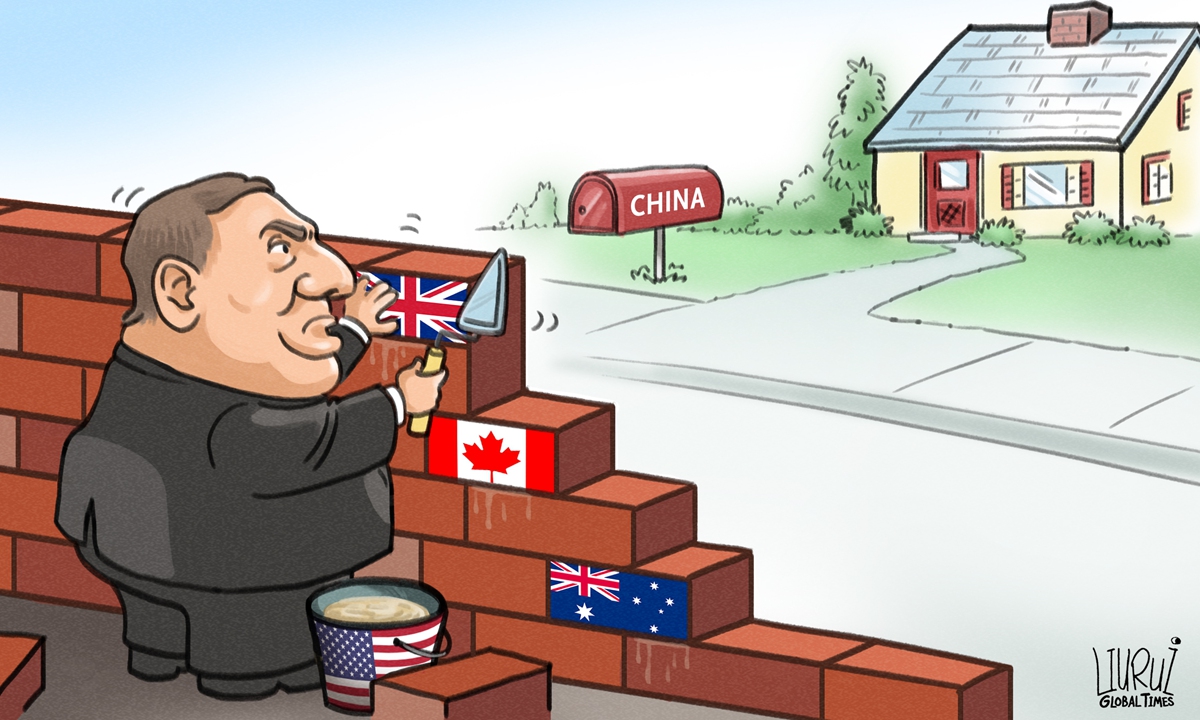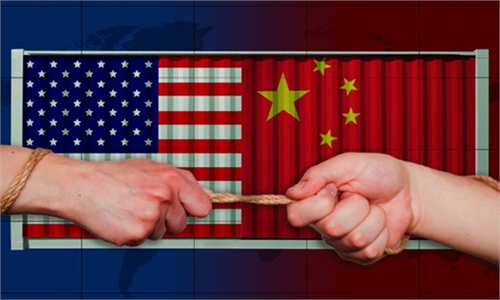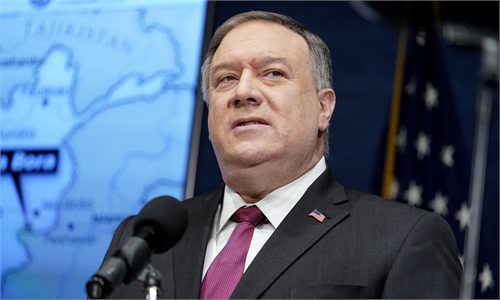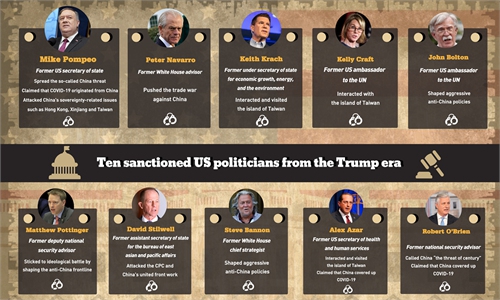
Coaxing US allies, relentlessly smearing China, promoting misinformation, Pompeo has gone to crazy extremes to attack China. Graphics:GT
While the inauguration ceremony of the 46th president of the US has brought the pandemic-stricken and ever-divergent country into a new era, as many had expected, solemn pledges, inspiring songs and calls for unity and healing with splendid fireworks in the night became a touching moment for not only many Americans but also Chinese diplomats, policy advisors and observers of the China-US relationship who hope that a new chapter will begin for bilateral ties, which have been heavily damaged during Trump's four-year term in the White House.
After days of denouncing former US secretary of state Mike Pompeo in the harshest words so far by calling him "Mr Liar" and the "clown of the century," Hua Chunying, spokesperson of the Chinese Foreign Ministry, used a much softer tone at Thursday's routine press conference, when she said that she viewed the inauguration ceremony and the fireworks, sharing some sympathy with it too. Hua, like many Chinese diplomats and government policy advisors who closely observe the China-US relationship and feel regret about ties spiraling to their lowest point since the establishment of the diplomatic relationship under Trump, hoped that with the new US president in office, positive signs would emerge for the improvement of bilateral relations.
"The recent period had not been easy for us, which was highly challenging and unusual. But both Chinese and American people deserve a better future." Hua told reporters.
Cui Tiankai, Chinese Ambassador to the US, also expressed high expectation for working with the Biden government by sending congratulatory message on social media. "China looks forward to working with the new administration to promote sound & steady development of China-US relations and jointly address global challenges in public health, climate change & growth," Cui said in a Tweet on Thursday.
Approximately 12 hours before Hua expressed her high expectations for the future of the China-US relationship, fully unleashing a goodwill gesture from the Chinese government, the Chinese Foreign Ministry announced sanctions on 28 Americans including some former high-level officials of the Trump administration like Pompeo. The announcement, made at midnight just minutes after Biden was sworn in as the new president, was believed by experts to be a well-timed and vigorous demonstration of Beijing's bottom line in its counterattack against anti-China forces.
The move also serves to set the tone for the future bilateral relationship, urging the cleaning-up of the political mess left behind by some "poisoning factors" inside Washington, according to observers.
In a statement released on its website around Wednesday midnight (Beijing time), the ministry said that over the last few years, some anti-China politicians in the US, including Pompeo, out of selfish political interests and prejudice and hatred against China and showing no regard for the interests of the Chinese and American people, had planned, promoted and executed a series of crazy moves which gravely interfered in China's internal affairs, undermined China's interests, offended the Chinese people and seriously disrupted China-US relations.
The ministry said that China had decided to sanction them for seriously violating China's sovereignty who were mainly responsible for such US moves on China-related issues including Pompeo, former White House adviser Peter Navarro who pushed the yearlong trade war against China, former national security advisor Robert O'Brien, China strategist Matthew Pottinger and Steve Bannon, a former White House adviser and one of Washington's most strident China hawks.
Other officials sanctioned by the Chinese government included David Stilwell, Alex Azar, Keith Krach and Kelly Craft of the Trump administration as well as former national security adviser John Bolton.
These individuals and their immediate family members were prohibited from entering the Chinese mainland, Hong Kong and Macao of China. Companies and institutions associated with them are also restricted from doing business with China.
When quizzed about the other 18 Americans sanctioned by the Chinese government, Hua said on Thursday "whoever has done anything bad is certainly clear about it," without releasing the names of the others on the sanction list. Still, she emphasized that "let the good angels come back to bless bilateral ties and prevail, defeating the evil forces through joint efforts from the two sides."
"Treating each political figure differently fully underscores China's positive attitude on fixing, stabilizing and developing the China-US relationship, hoping that existing positive factors be further strengthened," Diao Daming, an expert on US studies at Renmin University of China in Beijing, told the Global Times on Thursday.
At the same time, the sanctions were a "top-notch response" to those who have been poisoning China-US relations over the last few years and the most straightforward way of drawing Beijing's "bottom line" on future China-US relations, according to Chinese experts.
Who are the evil ones?
Ten Americans sanctioned by the Chinese government and named on the list include certain long-term anti-China hawks who had helped shape the Trump administration's ill-intentioned policies curbing China on multiple fronts including trade, human rights issues, Hong Kong, Xinjiang and the island of Taiwan. Pompeo, for example, had been infamous for attacking China's political system and the ruling Communist Party of China, smearing the country by falsely claiming COVID-19 originated from a virology lab in Wuhan in Central China's Hubei. He also played the role of "the black hand" behind a number of documents and acts on China's Xinjiang and Hong Kong.
Other individuals on the list included some senior advisors such as Matthew Pottinger, who had been waging an ideological battle by shaping the anti-China frontline in partisan policies, and Robert O'Brien, who called China "the threat of century" and claimed that it covered up COVID-19 from the WHO. It also targets infamous anti-China conservatives like former White House advisor Peter Navarro, who pushed the yearlong trade war against China and Steve Bannon, former White House chief strategist who shaped aggressive anti-China policies while spreading China-related conspiracy theories.
It was also worth noting that at least four US diplomats including former US ambassador to the UN Kelly Craft, Alex Azar, former United States secretary of health and human services, and Keith Krach, former undersecretary of state for economic growth, energy, and the environment, who had either visited or interacted with the island of Taiwan, severely challenging Beijing's one-China principle, which lays the foundation for China-US ties.
The message was clear. It aimed to punish former US officials who had contained China in a reckless manner, telling those politicians that they should bear the consequences and meanwhile send out a warning to the US that when it comes to China policy, it should always respect China's core interests and safeguard the bottom line of ethics and regulations, Li Haidong, a professor at the Institute of International Relations of China Foreign Affairs University, told the Global Times on Thursday.
Cleaning up 'poisoning factors'
The Taiwan Affairs Office of China's State Council expressed firm support on Thursday for the sanctions on relevant US personnel who have acted recklessly on the Taiwan question, denouncing the Taiwan Democratic Progressive Party authorities that have colluded with Pompeo and likeminded individuals, starting deranged provocations to seek secessionism in addition to acting as pawns of anti-China forces and betraying national interests.
The Office of Hong Kong and Macao Affairs of the State Council also applauded the sanctions on Thursday, saying it brings a great satisfaction to the public , as it's widely known that Pompeo has been interfering in Hong Kong affairs in a reckless manner, smearing "one country, two systems" principle and violating international law and standards. The sanction is well deserved, a spokesperson of the office said.
Lü Xiang, an expert of US studies at the Chinese Academy of Social Sciences in Beijing, told the Global Times Thursday that in US politics, there is traditionally a revolving door for US politicians to be employed in private sector companies, financial institutes and think tanks after they leave office.
The sanction would seriously affect "the politicians' road for gaining money," Lü said. "For instance, like Stilwell on the sanction list, we met in Washington when he was going to retire from the Joint Chiefs of Staff in 2015," Lü said. "At that time, the issues that most interested him were about doing business."
Lü noted that with the deeply intertwined economic ties between the two countries, most major US companies, financial institutes and think tanks would unavoidably need to develop ties with China, making them reluctant to hire those on the sanction list.
"This powerful sanction is also a warning to the officials who want to be the next Pompeo," Lü said.
As the old saying goes, "what goes around comes around," and now is the right time, Shen Yi, a professor of Fudan University in Shanghai, told the Global Times, noting that these individuals and companies can no longer benefit from the development of the China-US relationship.
Over the past few years, those individuals sanctioned set up way too many obstacles in bilateral ties, burned down too many bridges and damaged too many roads, Hua said. And when Biden took office, it became time to repair ties and rebuild trust between Washington and Beijing.
"Both countries need to possess the courage to listen to each other, respect each other and conduct the relationship properly, which would be in line with the expectations of the international community," Hua said.






